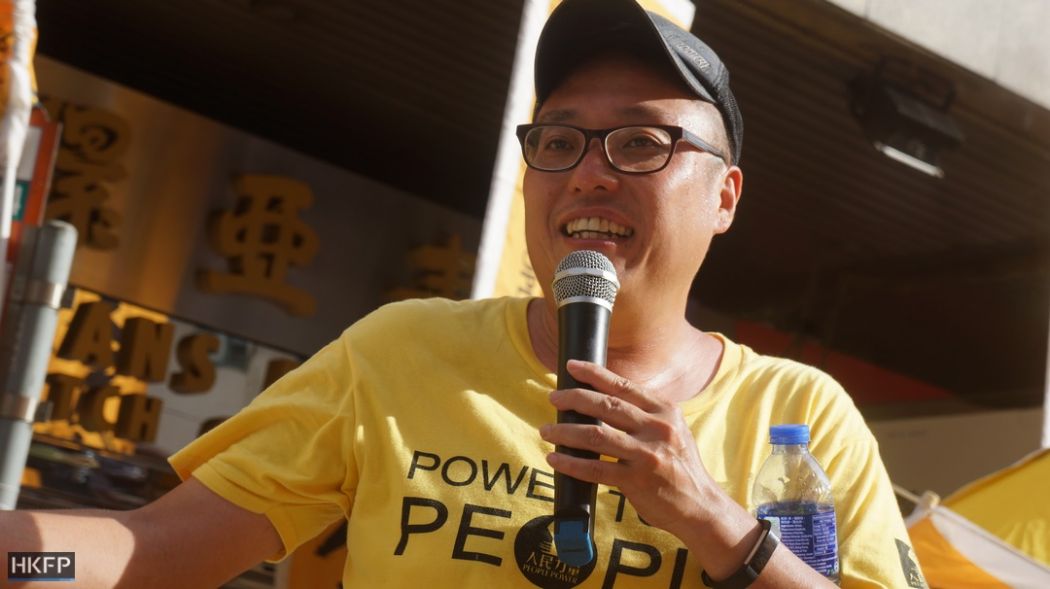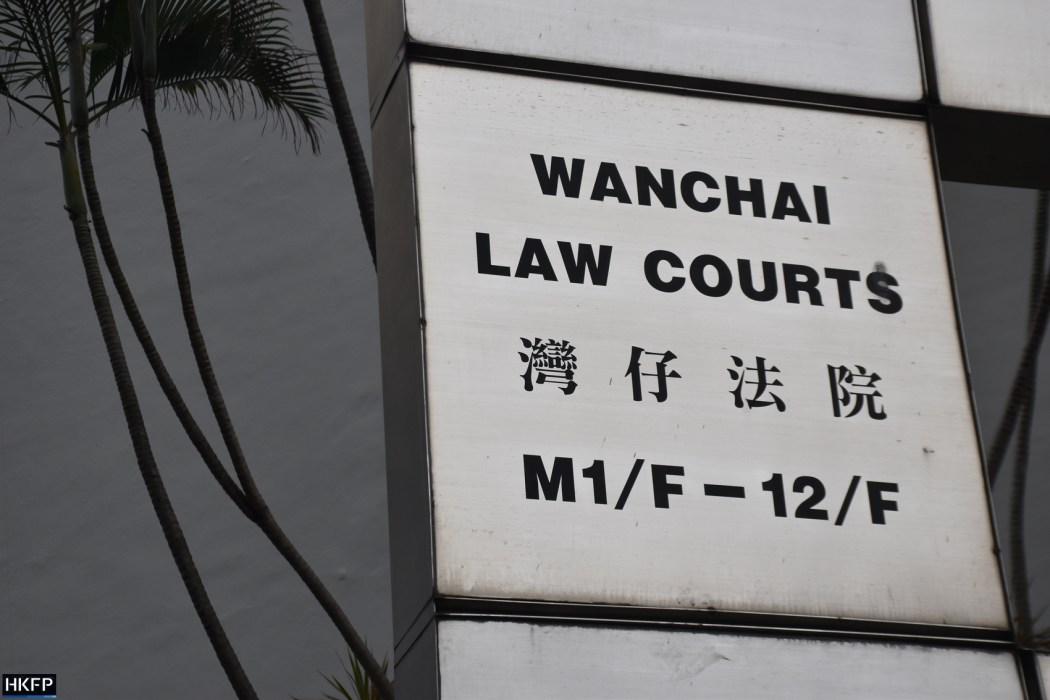Hong Kong pro-democracy activist “Fast Beat” Tam Tak-chi has been sentenced to 40 months in jail and given a HK$5,000 fine after being convicted of 11 charges, including seven counts under the colonial-era sedition law.
The DJ and former vice-chair of People Power has been held in custody since he was arrested in September 2020. He appeared in front of handpicked national security judge Stanley Chan at the District Court on Wednesday.

The 50-year-old activist faced 14 charges, including “uttering seditious words,” disorderly conduct in a public place, conspiracy to utter seditious words, holding or convening an unauthorised assembly, incitement to knowingly take part in an unauthorised assembly, and refusing to obey an order given by an authorised officer.
He was accused by the prosecution of making baseless accusations against the Hong Kong police, and insulting them by describing them as “damned black cops.”
During his trial, Tam also stood accused of chanting the controversial slogan “liberate Hong Kong, revolution of our times,” a phrase which was ruled as capable of inciting others to commit secession in the city’s first national security trial.
In his verdict delivered last month, Chan ruled that there was no difference between words targeting the Communist Party, the central government, or the Hong Kong government.
| Charge | Verdict | Sentence | Suspended? |
|---|---|---|---|
| 1. Incitement to knowingly take part in an unauthorised assembly | Guilty | 2 years | No |
| 2. Uttering seditious words | Guilty | 15 months | No |
| 3. Disorderly conduct in a public place | Guilty | 1 month | No |
| 4. Uttering seditious words | Guilty | 15 months | No |
| 5. Disorderly conduct in a public place | Not guilty | n.a. | n.a. |
| 6. Holding or convening an unauthorised assembly | Guilty | 18 months | No |
| 7. Disorderly conduct in a public place | No guilty | n.a. | n.a. |
| 8. Refusing or wilfully neglecting to obey an order given by an authorised officer | Guilty | HK$5,000 fine | n.a. |
| 9. Uttering seditious words | Guilty | 15 months | n.a. |
| 10. Uttering seditious words | Guilty | 18 months | n.a. |
| 11. Conspiracy to utter seditious words | Not guilty | n.a. | n.a. |
| 12. Uttering seditious words | Guilty | 18 months | No |
| 13. Uttering seditious words | Gulity | 18 months | No |
| 14. Uttering seditious words | Guilty | 18 months | No |
“We all know the constitutional status of the Chinese Communist Party in the Chinese constitution. Even after deleting the words concerning the Communist Party, I think that the defendant still has seditious intentions aiming to undermine the SAR government,” Chan said.
“Because the SAR government is authorised by the Central government, this also undermines the Central government.”
Tam’s sentencing, initially scheduled for March 31, was delayed after the Judiciary adjourned all court proceedings between March 7 and April 11 owing to the city’s fifth wave of Covid-19.
Reasons for sentencing
When announcing his reasoning for sentencing, Chan said that the court had to take into consideration the “social and political reality” of Hong Kong, including the “unprecedented series of violent events” in 2019.
While the defence said in mitigation that Tam had a “genuine ideology,” and cited his background in theology, Chan read out parts of the activist’s speeches cited by the prosecution and said that he “could not see where it included his so-called ideology.”

Chan said that the activist’s words sounded like “the boundless abuse of an uncouth 50-year-old.”
The judge also said he had to take into account the time that the offence took place, as four of the seven sedition charges happened after the implementation of the national security law.
Chan also rejected the defence’s argument saying that Tam did not act out for his own purposes, and said that the claim was “obviously to dilute the defendant’s subjective wish to win in the primary election and continue into the Legislative Council.”
“The defendant’s multiple grandstanding saying that [he had to] beat the pro-establishment camp, and even to hit individual legislative councillors, there is only one purpose without a doubt, that is to enter the Legislative Council, enter Hong Kong’s administrative structure, and ‘enjoy’ the income, power, and social status given to him using government funds.”
When announcing the sentences for each of the 11 charges, Chan said he could not see any actual mitigating reasons.

Tam received 15 months for the three counts of uttering seditious words that happened before the enactment of the national security law in June 2020, and 18 months for the remaining four courts that took place after the legislation was implemented.
The judge initially ordered Tam to serve two years in jail for inciting others to knowingly take part in an unauthorised assembly, 21 months in total for the seven counts of uttering seditious words, one month for disorderly conduct in a public place, and 18 months for holding an unauthorised assembly.
Tam’s total jail term came to 40 months after Chan ruled that some sentences were to be served consecutively, including the two years for incitement to take part in an unauthorised assembly, 12 of the 21 months for uttering seditious words, three out of the 18 months for holding an unauthorised assembly, and the one month for disorderly conduct in a public place.
After the court session ended, Tam shouted: “Mum, take care of yourself, you will have to live longer to wait for me.”
Tam’s ex-DJ partner, former lawmaker Raymond Chan, was among those sitting in the public gallery. People stood up and waved at Tam as he stepped into the dock, and the activist waved back.

Tam is among the 47 pro-democracy figures awaiting trial under the national security law over their roles in a primary election for the 2020 Legislative Council election, which was later postponed.
Before giving his reasoning, Chan said that he would ask the prosecution to prepare cam recorders facing the public gallery in case there was any disorderly conduct.
“The court is the court, even if the judge is not inside the courtroom, it is still a court,” said Chan, adding that he will not allow any noise or “political promotion.”
Colonial-era sedition law
Tam became the first person to stand trial under the colonial-era sedition law after the handover. The legislation, last amended in the 1970s when Hong Kong was still under British colonial rule, is different from the Beijing-imposed national security law.
The sedition law, which falls under the Crimes Ordinance, criminalises incitement to violence, disaffection and other offences against the administration, whereas the national security law, enacted in June 2020, outlaws subversion, secession, collusion with foreign forces and terrorist acts, which were broadly defined to include disruption to transport and other infrastructure.
The enactment of the national security law gave police sweeping new powers, alarming democrats, civil society groups and trade partners, as such laws have been used broadly to silence and punish dissidents in China. However, the authorities say it has restored stability and peace to the city.
‘Dizzying speed’
Following Tam’s sentencing, senior China researcher for NGO Human Rights Watch’ Maya Wang said that the sentence showed “the dizzying speed at which Hong Kong’s freedoms are being eroded.”
“Tam’s harsh sentence exemplifies the dizzying speed at which Hong Kong’s freedoms are being eroded. Once known as Asia’s protest capital, Hong Kong is now sentencing people to years in prison simply for shouting slogans.”
Support HKFP | Policies & Ethics | Error/typo? | Contact Us | Newsletter | Transparency & Annual Report | Apps
Help safeguard press freedom & keep HKFP free for all readers by supporting our team




























